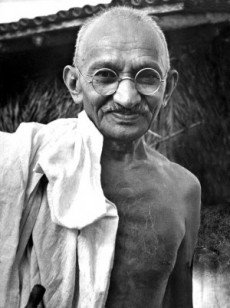Sunday, September 22, 2013[jbox color=”white”][mp3t track=”2013-09-22-DrUmaMajmudar-GandhisSatyagraha.mp3″ play=”Listen Now -” stop=”Pause -” title=”"Gandhiji’s Satyagraha" – Dr. Uma Majmudar”]
Or download the MP3 to your computer, and listen offline.
[/jbox]
Uma Mujmadar writes, “Mahatma Gandhi equated Love and Truth, saying that God is Love and Love, Truth. He worshiped God as Truth, the unchanging Reality beyond time and space, an all-pervading presence that is both transcendent and immanent. Since our roots are in God, we are all potentially divine and partake of the divine nature — which is unconditional love, nonviolent love, forgiving love. Thus, Gandhiji interpreted nonviolence not as a passive virtue of non-injury but as an active principle of unconditional, universal, compassionate love. He wrote in Navajivan (Nov. 4, 1928), ‘Nonviolence means universal love; it implies compassion for all living beings and the resultant strength to sacrifice oneself.’ Therefore, there is an inviolable connection in Gandhian thought between satya (truth) and ahimsa (nonviolence). To him, they are two sides of the same coin. As he wrote in his Autobiography, ‘to see the universal and all pervading Spirit of Truth face to face, one must be able to love the meanest of creation as oneself.’ (1948, p. 615).” Uma tells us how these beliefs translated into Gandhiji’s “operating principle” of Satyagraha. |
